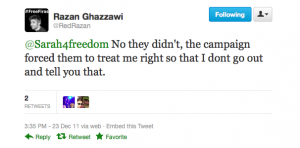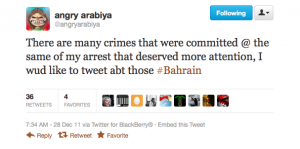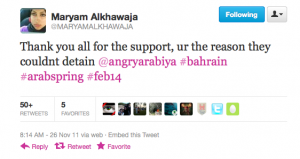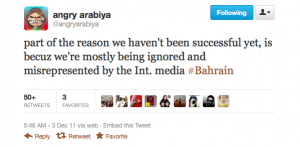Edit: A Saudi contact points out that campaigns have been helpful in the cases of Manal al-Sharif and Feras Begnah, but adds: “It seems that only when it’s way too silly to arrest people, massive attention will be given and the government is likely to [surrender].”
When Egyptian-American journalist Mona Eltahawy was briefly detained–and beaten–by Egyptian authorities (read her account of that here), there was a concerted and fast-moving effort by her Twitter followers and friends online to quickly mobilize a solidarity campaign for her release, followed–post-release–by much discussion as to whether or not the campaign had actually helped. In Eltahawy’s case, I would wager that her relative fame and dual citizenship played a larger role than anything done online, but the global attention certainly didn’t hurt (for more on this, Zeynep Tufekci has done some fascinating analysis).
Tufekci hints that a campaign like #FreeMona or #FreeAlaa (Abd El Fattah) can improve the situation of other imprisoned Egyptians but doesn’t ask the question of whether campaigns like those can help lesser-known bloggers. As she points out, both Eltahawy and Abd El Fattah are well-known, sympathetic figures. Both received ample attention both from inside and outside of Egypt (by contrast, note how the campaign for Maikel Nabil has lagged). And yet, lesser-known bloggers are regularly made the object of solidarity campaigns: All it takes is one friend, one family member, or one sympathetic blogger from their country to throw up a site and get some attention on Twitter or Facebook. It may take longer, but evidence shows that the majority of these campaigns do result in significant attention. So, the question then, is this: Does that attention really help the individual?
I’ve been wondering this myself for some time, having been involved in numerous solidarity campaigns, including ones where the family of the detainee was somewhat uncomfortable with the campaigning, despite having given permission. There are times when the family or friends think a campaign might make the blogger’s situation worse; in most such cases that I’ve seen, they give in after a few weeks of no changes. Though I don’t think there are any conclusive answers as of yet, I’d like to share what little evidence I have come up with (some of which is, unfortunately, anonymous) to further the discussion.
First, we have a recent interview with Alaa Abd El Fattah, an Egyptian blogger and personal friend who was detained for 56 days, and released on December 25. In it, Abd El Fattah says [ at approximately 11:47]:
They knew that they couldn’t torture me because of the solidarity and the media attention, so they just made sure to try to use every other measure to put me at discomfort or add psychological pressure. But every other person arrested in the Maspero incident were tortured severely, and torture is still very systematic at police stations and in prisons.
In this case, there’s obviously very little to get excited about: Individuals without the benefit of global campaigns were still tortured, and Abd El Fattah was still detained for 56 days and made uncomfortable. And yet, he believes that the solidarity saved him personally from torture.
An account from Razan Ghazzawi’s blog also suggests that Syrian blogger Hussein Ghrer (whom, I should mention, is not well-known outside of the Syrian blogosphere) received better treatment after his case was amplified by the international blogosphere and media:
The 32 year-old blogger was kidnapped in Damascus in an ambush on 24-10-2011 and was taken to security services branches in Al-Khateeb and Kafaقsouseh, then was transferred to Adra prison, a prison that is considered by activists and revolutionaries as “haven” in comparison to security services, or worse, Air Intelligence service- a place where worst kinds of torture is practiced against detainees.
Ghazzawi, detained from 1-19 December, also stated that the campaign on her behalf was helpful in securing better treatment:

Azyz Amami, who was detained in Tunisia in January along with Slim Amamou, recalls that he and Amamou also later declared, on Tunisian television, that the international campaign for their release was helpful.
And speaking to Radio Free Europe/Radio Liberty, Azeri journalist Eynulla Fatullayev credited international campaigns with saving his life and securing his release.
I have also interviewed–on the condition of anonymity–three other people who have been detained in various countries, and who have been the subject of solidarity campaigns. Each said a variation on the same theme: That they were treated well, and sometimes even given special privileges, because of their status. One mentioned that it bothered him that the same treatment was not extended to his fellow detainees, a reminder that being a blogger is a position of privilege in its own way. Similar to his sentiment is that expressed by recently-released Bahraini blogger Zainab Al-Khawaja, who tweeted the day of her release:

Al-Khawaja’s sister, Maryam, had also previously suggested that international support was the reason Zainab was not arrested at an earlier instance:

But all of the bloggers I’ve spoken to individually have emphasized the importance of permission from family and/or friends before starting up a campaign (a recommendation cited in a recent post I co-wrote for EFF and Global Voices Advocacy). This isn’t always an easy thing to do, of course, and in some cases, may result in no campaign at all (if friends can’t contact family members, for instance).
There is also, I might add, evidence that some campaigns don’t help at all. Take, for example, that of Tal Al-Mallouhi, the teenaged Syrian blogger now imprisoned for two years, for allegedly spying for a foreign government. Despite ample international outcry, including from such prominent organizations as Amnesty International, Mallouhi remains in prison following an unfair trial. On the flip side, a lack of international attention can be detrimental, as Zainab Al-Khawaja points out:

Ultimately, the only definitive takeaway from these cases is that authorities are paying attention to them. And that alone is enough to suggest that, in most cases (taking into consideration a blogger’s personal circumstances), solidarity campaigns that draw on international media are beneficial, if only minimally.
So, how can bloggers who are not as well-connected as Abd El Fattah or Eltahawy ensure that their name won’t be forgotten? At a recent event I spoke at in Istanbul, incidentally, a Turkish blogger asked me just that question. My short response at the time was–and I stand by this–to plug in to international networks, something which social media has made incredibly easy. The aforementioned EFF/Advox post puts forward some other recommendations, but I have no doubt there are others, and I look forward to whatever discussion this might generate.
7 replies on “Do solidarity campaigns really help bloggers?”
I know one case in Syria where the detainee’s family preferred to keep his arrest on a low profile and unfortunately this guy was tortured, the torture stopped when his arrest got more international attention in social media/trad media
You sort of touch on this, but a successful campaign can also make a previously unknown blogger known. In many cases the general public never knew a person existed before they were arrested. This may sometimes draw unwelcome branding as a dissident, radical, activist or other labels the person might not agree with themselves – but it can also be of great help to a blogger later on, both to gain a larger following when they are released, and also as an additional buffer if they are arrested or threatened again. A good campaign also creates a permanent record of what happened and what was said, which even without mega media coverage is important. In several cases, revisiting past “free blogger X” websites has been useful for creating new ones years later.
Excellent point, Solana. I’d love to talk to a few bloggers in this situation to get their thoughts on whether it ultimately helped or harmed their case.
Thanks for writing this timely and interesting post. I think the most critical issues are counseling the close friends/family of the blogger before starting the campaign. Some people can become really compromised because of such campaigns. This also depends on the type of activism the blogger is involved in. How this activism is portrayed may resound differently in different context.
For example in the case of Maikel Nabil, I believe the campaign has helped him stay in the spotlight and keep the followers updated of his struggles with the military court system and his writings from inside his cell. Without the campaign, Maikel could have been forgotten, and we all know Maikel is stigmatized because of his pro-Israel views but with the continuous campaign, more people spoke up about his unjust detention.
I finally think that each blogger should probably think in advance of campaign strategies and share it with close ones, though we all get caught in the everyday struggle and push that thought away!
Thanks Ahmed,
I agree – I think that it’s impossible for outsiders–or in some cases, even insiders–to assess for someone else their level of risk with a campaign.
Maikel’s case is a really interesting one in this sense – he’s received more international blogosphere attention, perhaps because (rather than in spite of) his political views and bravery, but has obviously been stigmatized within certain communities. But, I’ve been happy to see increased attention more recently from within Egypt.
Thanks again – this is great :)
Thanks for these really good feedback about our little tweets for Freedom…
Its really a problem to take care about the situation of bloggers families, as explained by Ahmed; but generally, when i see an universal already tweeeted situation, i go ahead; for more complicated case, i mean its necessary to act with existing organization and not so with feeling&acting.
For that, i mean that Amnesty action is really good for many cases like these one in Iran : https://twitter.com/#!/AmnestyOnline/status/160055929855942656
In any case its better to organize a little more, like @RedRazan planned to do : https://twitter.com/#!/RedRazan/status/157952044685213696
Thanks for your action :-)
[…] credited his campaign with saving his life. Similarly, Bahraini activist Maryam Al-Khawaja has credited media attention for once preventing the arrest of her sister, activist Zainab […]